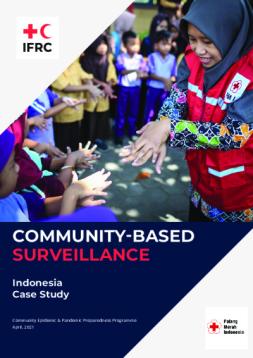Indonesia is prone to hazards such as floods, earthquakes, and tsunamis. A vast and highly-populated archipelago is also at risk for epidemic and pandemic diseases due to its natural hazard profile, large population and density, high movement of people, limited healthcare capacities and coverage, and low level of health literacy in many communities, among other factors. These characteristics increase the risk of disease outbreaks in communities.
Community members are usually the first to know when a suspicious or unusual health event has occurred in their community – so enabling, empowering, and equipping communities to recognize and respond to public health threats in their midst not only makes sense but also forms an essential foundation for the concept of community-based surveillance (CBS).
To operationalize this approach and strengthen community-level readiness in Indonesia, the IFRC and the Indonesia Red Cross have undertaken the Community Epidemic and Pandemic Preparedness Programme (CP3).




